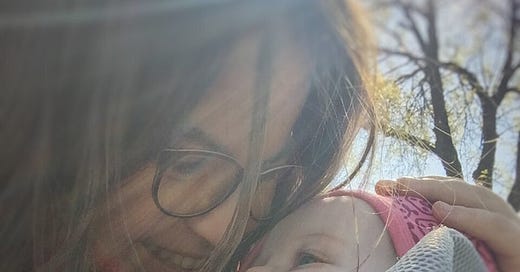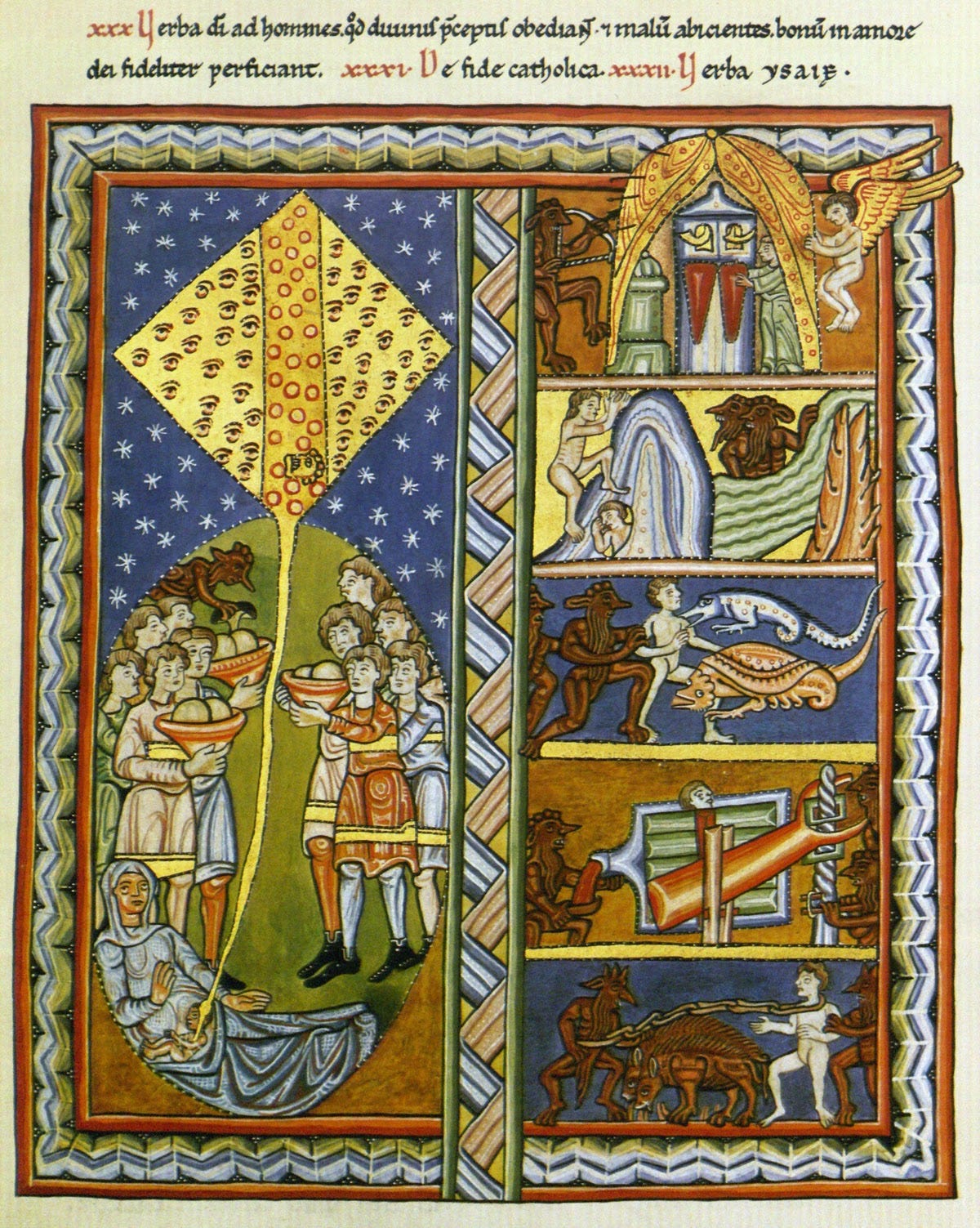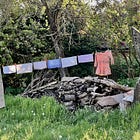Giving Life: On the Poignancy of Motherhood.
Though the world tells us to have a “happy” Mother’s Day, for many the day comes with a bittersweet undertone. Hildegard of Bingen offers us some consolation here.
Dear fellow pilgrim,
Some years ago, I wrote about the bittersweet character of Mother’s Day—and the sacredness of “mothering” in all its forms, as Hildegard of Bingen so powerfully evokes.
This weekend, as I guide our Sacred Greening Hildegard retreat at the monastery, I find myself drawn back to these themes: not only of motherhood, but of longing, loss, love, and the deep desire to belong.
Because even though the world urges us to “have a happy Mother’s Day,” for many the day carries a quiet ache.
So today, I offer this reflection to all who hold stories of mothering and being mothered—whether by birth or by spirit, whether with joy, pain, absence, or mystery.
And to those tending the sacred work of creating and nurturing life in any form.
But before I do so, I want to give my heart felt thanks to for becoming our 100th paid subscriber! I cannot tell you how much it means to me that 100 of you have chosen not only to walk with me but to support this unfolding journey.
Thank you. Thank you. From the bottom of my heart.
Contemplating motherhood. A mother’s day reflection (not only for mothers)
Some things you only understand once you've lived them.
For instance, the odd and sacred feeling when new life first settles in your womb.
Before, I had only listened to mothers’ stories—of birthing, tending, worrying over, or losing a child. But only when it happened to me could I walk into those feelings. Into the fierce tenderness and raw undoing. Into the knowledge of what a mother endures when the tender fruit of new life leaves her body before its time.
Like a flood that washes away the future, we are left behind—in pain, but also in awe of how the emptied body slowly restores itself. Since that time, I’ve wondered in new ways about the mystery and vulnerability of motherhood.
Having borne, nurtured, and lost our children, mothers know from experience about hope and fear. We have wrestled with the big questions of being and non-being—not only with our minds, but with our whole existence.
Being granted the ability to give life, we are also confronted with its fragility. With the sorrows and joys motherhood carries in its very core.
For some, Mother’s Day arrives with a bittersweet ache. No smiling children posting cheerful messages. Some have lost their children before they could birth them; some lost them later—to death, to silence, to life.
All mothers are also daughters. Some cherishing. Some mourning. Some still struggling with their own mothers.
I think of a client who grew up with a cold, rejecting mother and now suffers from his own lack of warmth. Or the woman who was given away as a baby—still searching, still longing—for her birth mother. No love, no appreciation, no empathy could heal that wound of the lost mother until, at last, she found her. Held her. And was held.
There is, in all of us—sons and daughters alike—a deep longing for our motherly home.
Hildegard of Bingen (1098–1179) has embedded this longing at the heart of her understanding of human creation.
She describes the soul’s journey as one that begins in the mother’s womb, longing to find a place to pitch its tent, its spiritual home. We are born as soul and body in unity, with our “original wisdom” (Sophia) folded within us, like a tent waiting to be unfolded.
Illumination from Liber Scivias: "Die Seele und ihr Zelt" (The soul and its tent) picturing the divine spark entering the human body (left) and it's journey throughout the challenges and difficulties of life (right, from bottom up) until finding the place to unfold her tent of rest."
Life’s journey is setting up this tent.
Hildegard speaks poignantly of the soul’s longing and its lamentations:
“Oh Mother Zion, where shall I flee?
For I am a living breath which God has placed in dry mud…”
But after giving space to the soul’s grief, she also offers hope.
Mother Zion replies:
“O daughter, run! For the Most Powerful Giver, whom no one can resist, has given you wings to fly with.
Therefore fly swiftly over all these obstacles…”
To remind a person that they are both soul and body—and that the soul has wings to rise beyond the obstacles of this life—is perhaps the most sacred part of a therapist’s work. Hildegard gave us a powerful image for the hidden journeys of the soul.
She herself was never a mother by birth. She never gave physical life to a child. And yet she became a mother to many: a foremother, a spiritual mother, a bearer of wisdom and fierce love.
For her, motherhood was more than biology. It was the sacred metaphor for the life force of all creation.
It stands at the heart of her theology and her cosmology. She points us again and again to Mother Earth—to the fertility of all being, the greening power (viriditas) of life.
In the illumination above, she describes Love as a young woman:
“The young woman whom you see is Love. She has her tent in eternity...
It was Love that stood at the beginning, when God said: Let it be!
And it was. As though in the blinking of an eye, the whole of creation was formed through Love...
She made everything. Adam and Eve as well were formed by Love, from the pure nature of the Earth.”
Though mothers can teach us from their unique experience, we do not need to be mothers—or even women—to participate in love’s creation.
Each of us carries the spiritual capacity to birth new life. To create and re-create.
We know the labor of insight. We have felt the birthing pain of change.
We’ve known the joy that ensouls us when something holy is born within.
We are all sons and daughters of Mother Earth.
Mothered by love’s creation.
Living beings, longing for a resting place.
And do not forget:
The Giver of Life has given your soul wings.
So here is my blessing for all who are mothering:
And if this mother’s day
has come to you
wrapped in ambivalence,joy and sorrow
densely interwoven
indistinguishable,tend patiently to each
young green shoot growing
quietly
towards the sununder the dead layers
of wet, nourishing leaves.AF
With great love, Almut (aka The Weary Pilgrim)
PS: If you can, leave a heart, a word or a line which resonated with you in the comments, so we know you have been here :-)
To Ponder
🌿 What has been mothered in me—and what in me still longs to be held, nurtured, or seen?
🌿 Where have I experienced the labor of love—not in giving birth to a child, but in creating, tending, or letting go of something sacred?
Thank you for reading, sharing and supporting Cloister Notes, a letter for dancing monks and weary pilgrims. If you have been moved by what you are reading do consider becoming a sustaining subscriber, joining our intimate communion of fellow pilgrims on the deeper way.
Thank you, thank you.
You can also share this letter by simply forwarding this email or by sharing it online.
Too many emails? You can manage your subscription here.
In case you missed it

Retreating to the Garden. Monastic Gardens as places of nature, nurture, contemplation and healing.
About Cloister Notes
A letter for dancing monks and weary pilgrims at the intersection of psychology, philosophy, and spirituality. Contemplations on being human to deepen your path, nourish your heart, and build wisdom within. A resting place along the way—a space for reflection, courage, and hope.
About The Weary Pilgrim
Almut is a German-American scholar and practitioner of existential wisdom teachings. A psychologist turned philosopher turned writer, she also walks as a traveler, photographer, retreat leader, and mother of a kindergartener. Her work engages with voices like Kierkegaard, Buber, Frankl, Yalom, Edith Stein, Bonhoeffer, and Hildegard of Bingen. A Benedictine Oblate, she lives with her family in a small college town in the American Midwest.










This is a lovely concept of wings. Sometimes I feel like my wings are wet and I cannot fly. And always hope and love.
There is a refreshing honesty about Almut's comments - never "pollyannish" and yet, hopeful.